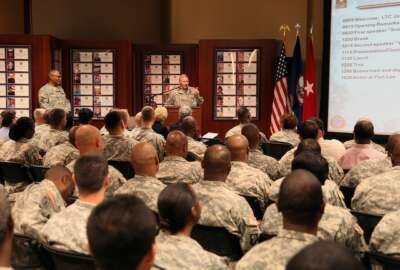Air Force working with OPM to hire civilians faster
The Air Force Personnel Center commander says civilian hiring is one of the biggest struggles the service is going through right now.
Best listening experience is on Chrome, Firefox or Safari. Subscribe to Federal Drive’s daily audio interviews on Apple Podcasts or PodcastOne.
Congress might be considering changes to the way it hires and promotes officers in the military this year in the 2019 defense authorization bill. But when it comes to civilians, the military services aren’t getting any reprieve.
Gen. Brian Kelly, the Air Force Personnel Center (AFPC) commander, said civilian hiring is one of the biggest struggles the service is going through right now.
To alleviate the problem AFPC is working with the Office of Personnel Management and Congress to see if it can find any flexibility to hire civilians faster and bring former service members back into the force as civilians quicker.
“One of our biggest challenges is on the civilian side and particularly it’s on the civilian side in regard to how we remain competitive and how we remain attractive to recruit and retain civilian talent using the existing federal hiring practices and regulations,” Kelly told Federal News Radio.
Kelly added that the Air Force is not alone in its feelings that the rules and regulations regarding civilian hiring are outdated.
“It takes us entirely too long to hire civilians. When you’re taking months to hire and onboard a civilian, whereas your competition in the civilian and private sector might be able to do so in days and sometimes hours, it’s very difficult to compete for the talent you want and where you need to go,” Kelly said.
AFPC is also working internally to change any rules it can inside the center to quicken the civilian hiring pace.
“In the areas we have mission focus on for maintenance personnel, in some cases for air traffic controllers, for simulator operators in the operational world has a direct impact on our warfighting focus on a daily basis. Our ability to track those folks and get them into the system right away is sometimes hampered by the existing processes and rule sets,” Kelly said.
The Air Force also wants Congress to look at situations in which retiring service members must wait 180 days before being hired by the government as a civilian.
Kelly said sometimes the retiring service members are the only real avenue to obtain the skills they need in a civilian, like a simulator operator.
Latest Defense News
“It’s not easy to find an F-22 operator in the private sector, but if you have a retiring military member who has those skill sets, the ability to get them over and move them to your side and be competitive is certainly an advantage that we’d like to have,” Kelly said.
The 180-day waiting period has been on the books since 1964. It was temporarily set aside in the aftermath of the Sept. 11 attacks, but was reinstated last year.
The Navy is going through the same issue. Vice Adm. Thomas Moore, commander of the Naval Air Systems Command, said it makes sense for Congress to abolish the requirement altogether — at least when it comes to in-demand depot maintenance personnel.
“We’re in a competition for talent, not only in our naval shipyards, but with the private sector,” he told the House Armed Services Committee Thursday. “These young men and women that are coming out of our services are technically capable and ready to go into the depots. And if they have to wait 180 days, sometimes we lose the opportunity to get them.”
The Defense Department already created a new personnel system for civilians with cyber skills.
The 2016 defense authorization act gave the Defense Department broad authority to hire new cyber workers outside of the usual competitive service process, subjects employees who become part of the system to a three-year probationary period instead of the one year standard for most federal jobs and lets DoD give those workers additional pay and bonuses as a retention incentive.
Read more of the DoD Personnel Report.
Copyright © 2025 Federal News Network. All rights reserved. This website is not intended for users located within the European Economic Area.
Scott Maucione is a defense reporter for Federal News Network and reports on human capital, workforce and the Defense Department at-large.
Follow @smaucioneWFED





